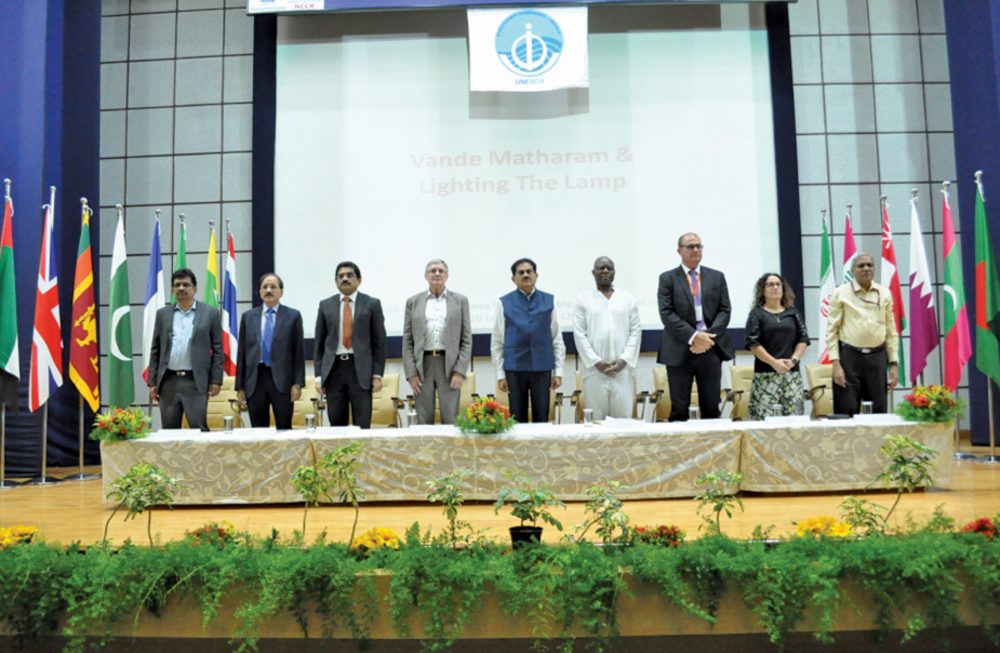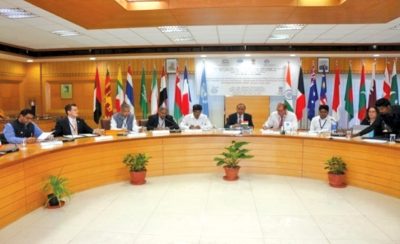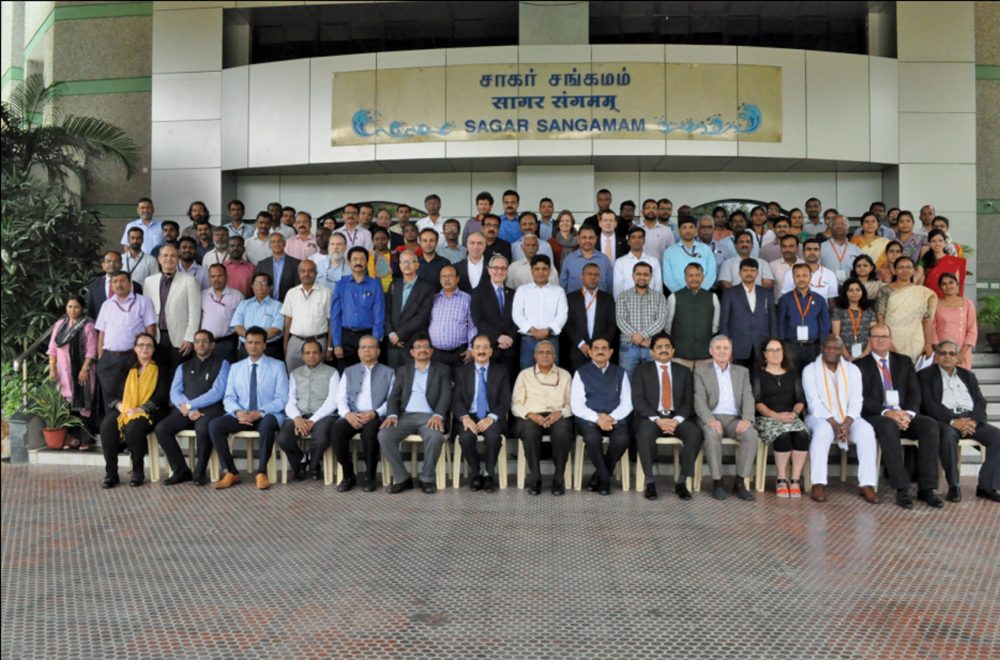In preparation for the Ocean Decade, a Regional Planning Workshop for the Northern/Central Indian Ocean countries as well as ROPME sea area was conducted in the National Institute of Ocean Technology
June 27, 2020
by A. Atmanand
Background
The United Nations has proclaimed a Decade of Ocean Science for Sustainable Development (2021-2030) to support efforts to reverse the cycle of decline in ocean health and gather ocean stakeholders worldwide behind a common framework that will ensure ocean science can fully support countries in creating improved conditions for sustainable development of the Ocean.
The Intergovernmental Oceanographic Commission of UNESCO (IOC/UNESCO) was tasked to coordinate the Decade’s preparatory process (2018-2020). This involved inviting the global ocean community to jointly prepare an implementation plan for the Decade in ocean science and technology to deliver, together, the ocean we need for the future we want. This Implementation Plan will be submitted for approval to the 75th session of the UNGA in autumn 2020.
Global and regional consultative workshops are essential mechanisms in the Decade design process to achieve the objectives and to engage various communities through a multi-stakeholder process and structured dialogues. The first Global Planning Meeting held in Copenhagen, 13-15 May 2019, brought all key stakeholders with an interest in the Decade to the same level of information. Following this first global planning meeting, a series of regional workshops were planned to identify regional specific priorities and requirements as well as contributions to global objectives. It is in this connection the Regional Planning Workshop for the Northern/Central Indian Ocean countries as well as ROPME sea was held at NIOT during January 8-10, 2020.
Regional Planning Workshop for the Northern/Central Indian Ocean countries as well as ROPME sea area
The Regional Planning Workshop for the Northern/Central Indian Ocean countries as well as ROPME sea area was conducted by Ministry of Earth Sciences, Govt of India in the National Institute of Ocean Technology, Chennai, located in southern part of India between 8th -10th January, 2020, to identify the region’s specific priorities, requirements and contributions to the objectives of the UN decade of Ocean Sciences for sustainable Development. The agenda for the three day workshop had an inaugural session followed by well-structured panel discussions comprised of experts identified across six working groups followed by group discussions and a final wrap up with the summary and recommendation of each working group. As a prelude, an Intergovernmental Oceanographic Commission regional committee for The Central Indian Ocean (IOCINDIO) Leadership workshop on Developing the regional framework for coastal Vulnerability, was held from January 6-7, 2020.

Inaugural Session
Dr. M.A. Atmanand welcomed the delegates and gave a summary of the Global Planning meeting held at Copenhagen and on the activities of the National Institute of Technology. Dr. Justin Ahanhanzo, IOC, spoke on the genesis and overview of the UN Decade. Dr. Vladimir Ryabinin, Executive Secretary, IOC, talked about the importance of UN Decade and gave an overview of the various plans to be taken forward (video). Dr. Ariel Troisi, Chairperson, IOC, highlighted the importance of the Ocean decade and gave an overall action plan. (video). Dr. M. Rajeevan, Secretary, MoES, reiterated the commitment of India for the various SDG goals and the UN decade action plan (video). Dr. Karen Evans, EPG, IOC, highlighted the draft science plan for UN Decade. She highlighted the cross cutting and inter-connections between the various science themes. Dr. Sateesh C. Shenoi, Vice-Chair, IOC, gave the Keynote address. In his address, he highlighted six major issues viz. Climate Change – Sea Level Rise, de-oxygenated ocean (BoB, Arabian Sea), Ocean acidification, exploitation of living and non-living resources, marine biodiversity, marine pollution particularly plastics and risks. Dr. M.V. Ramana Murthy, Director, National Centre for Coastal Research (NCCR), gave the Vote of Thanks.
About 100 delegated from various IOCINDIO Member States including Australia, Bangladesh, France, India, Kuwait, Maldives, Saudi Arabia, UK participated; SACEP countries was represented by the Director General, SACEP; IOC-EPG members from Australia and Russia, NOAA-USA, IOC-Africa also participated in the three day workshop;
The participants were well-represented from all concerned sectors including Government organisations, academia, research institutes, etc., and about 23% were women delegates.
Working Groups

To steer the deliberations in the right direction, six working groups and panel members were identified and the detailed deliberations were held. The six working groups were:
- WG I: Clean Oceans
- WG II: Healthy and Resilient Ocean
- WG III: Predicted Oceans
- WG IV: Safe Oceans
- Work group V: A Sustainably Harvested and Productive Ocean
- Working Group VI: A Transparent and Accessible Ocean
Some of the major recommendations of each working group are as follows:
WG I on Clean Oceans recommended for collection of litter before it enters the marine system, and recycling of plastic waste, awareness on usefulness of change in the public perceptions towards plastic use, developing and implementing a proper plan for disposal of the marine litter collected during the beach cleanup operations.
WG II on Healthy and Resilient Ocean have stressed the need to identify the boundary between healthy and unhealthy ecosystems and the drivers affecting the ecosystems health and environment including invasive species, biofouling and the restoration steps needed to improve the health and resilience of oceans. Involvement of local communities in resource conservation, use of local knowledge for protection and conservation of resources and promoting ecosystem value services have all been identified as priority areas for a healthy and resilient ocean.
WG III on Predicted Oceans have recommended for the establishment of a data hub for mid-eastern region under IOCINDIO platform. In addition, an ocean prediction science team to be formed and a regional forum established to address all the issues related to predictive ocean.
WG IV on Safe Oceans with major points that emerged during the discussions that included mitigation or elimination of risk by developing proper models for risk assessment for operations at sea and a comprehensive coastal vulnerability assessment and efforts to minimize or eliminate false alarms about a possible extreme event.
WG V on a Sustainably Harvested and Productive Ocean have identified the need to develop a working concept that brings together the modes and means to enhance economic benefits and coastal livelihoods by sustainably harnessing the marine resources through capture fisheries and through responsible mariculture.
WG VI on Transparent and Accessible Ocean - major recommendations were that data and information goals should be user-driven and the ocean science community needs an accessible data system/portal to deliver data and info and should be coupled with an internationally developed and recognized data policy.

As part of IOCINDIO – IOCAFRICA collaboration initiation, interactions were held with participants from Cameroon and Ghana. A coastal vulnerability capacity building program is being initiated with IOCAFRICA through Kuwait, Bangladesh, Saudi Arabia and India. Participants from Bangladesh and India are expected to participate at the regional UN Decade planning workshop to be held at Nairobi during month end. A session was organised by Dr. Jay Pearlman (over Skype) and Drs. Sidney Thurston and R. Venkatesan on Ocean best practices, which is to be taken care during all observations planned during the decade. A session by Early Career Ocean Professionals (ECOPS) involved an exclusive interaction with the student community and about 80 students participated actively and interacted with Scientists/mentors from various countries.
Major Outcomes and Recommendations
The major recommendations from this region for UN Decade for Ocean Science for Sustainability are:
- To develop a Regional Framework for Coastal Vulnerability towards the Safety, Security and Sustainable Development of Member States in the Indian Ocean.
- Monitoring and Management of Marine litter and research on micro plastics
- Tsunami Early Warning in the Indian Ocean.
- Inventory with knowledge gaps in existing programmes, studies and researches maximizing their wide and equitable usage towards the UN Decade success.
- Establishment of the Indian Ocean Youth Leadership Network of Ocean, Climate and Atmospheric Scientists and Professionals.
- Establishment of Indian Ocean Leadership Mentoring Network.
- Progress Review Follow up of the Recommendations at the IIOE-2-2020 Meeting in Goa, India, March 2020.
The Regional Planning Workshop for the Northern/Central Indian Ocean countries, as well as ROPME sea area, provided an excellent platform for bringing together experts and stakeholders related to various aspects of the coastal and Ocean science and technology to deliberate and identify the region specific priorities, requirements and contributions to the global ocean science needed to support the sustainable development of our shared ocean.



